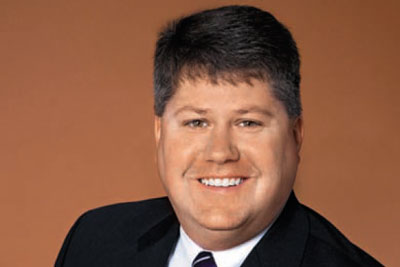Denny Kraichely, BS chemistry 1994, was named one of Pharm Exec’s 2011 Emerging Pharma Leaders. The award recognizes individuals who’ve made a positive difference in their organizations. Kraichely is associate director and chemistry, manufacturing & controls team leader of portfolio management & technical integration at Johnson & Johnson in Exton, Pa. UMSL Daily caught up with him to talk about his career, his time at UMSL and big pharma.
Congratulations on receiving the Emerging Leaders award. What does it mean to you?
It is, of course, a great honor. I am very happy to represent Johnson & Johnson for this prestigious award. It reinforced my belief that with hard work, great results will follow. Turning 40 next year does provide a time to reflect on what has been accomplished thus far, but I am even more excited to have many years ahead of me and the opportunity to continue to contribute to the best of my abilities.
How would you describe what you do?
The teams that I lead are at the key interface of discovery research and commercial manufacturing. As such what we do is transform molecules into medicines. More specifically, we synthesize the new molecules, demonstrate that they have the appropriate properties and activities to treat the disease, and fully characterize them to demonstrate that we can reproducibly deliver these medicines to patients.
Sometimes big pharmaceutical companies get a bad rap, how do you think your company and others are changing people’s perceptions?
Johnson & Johnson is a good example of a healthcare company that puts the patient first. There are innumerable examples of providing access to care both domestically and globally. The credo which all J&J employees follow, clearly lists the hierarchy of responsibilities as follows: patients, employees, communities, then finally stakeholders. These pharmaceutical businesses must make a sound profit to provide adequate resources for continued experimentation and future drug development.
Did you grow up in St. Louis? If so, where?
Yes, Hazelwood, Mo. I attended grade school at St. Martin de Porres followed by Hazelwood West High School.
Why did you choose UMSL?
I wanted to stay in Missouri for college and was most impressed by the chemistry department faculty and research facilities.
Why chemistry? Were you always into science as a kid?
I always enjoyed math and science, but became very interested in chemistry in high school. I really enjoyed the hands-on laboratory experiments and was fortunate to have been awarded a blue ribbon at the St. Louis Science Fair for my project “Motor Oil Viscosity: Effect of Temperature.”
How did your time at UMSL help you in your career?
It reinforced my belief that with hard work and proper planning, great results will follow. My research advisor, Joyce Corey, probably still recalls when I first met her at the end of my first year and I showed her that I had mapped out my remaining courses to be able to complete requirements for the Pierre Laclede Honors College, major in chemistry and minor in biology. This plan came to fruition when I graduated after eight semesters with the planned degrees noted above, as well as an unexpected honors in chemistry degree.
Despite my also working 20-30 hours per week at SmithKline Beecham Clinical Laboratories as a part-time lab assistant in the evenings, I was somehow able to complete these very ambitious goals while finding time to still have some fun and marry my wife Dena during spring break of my senior year. This period really set the tone for the 15 or so years since graduating from UMSL. This strong work ethic continues as I have been teaching general chemistry labs three evenings a week at a local college (Cabrini College in Radnor, Pa.) for the past nine years.
Would you recommend UMSL?
Yes, definitely. The faculty and research facilities at UMSL are a really underappreciated gem. The great advisors who provide students with opportunities to perform primary research leading to presentation at scientific conferences and publications in peer-reviewed scientific journals is a real differentiator.















